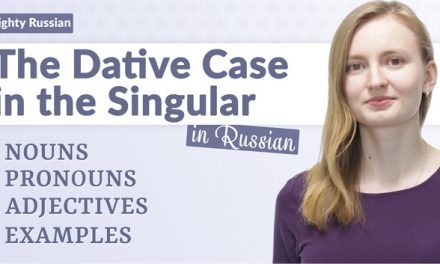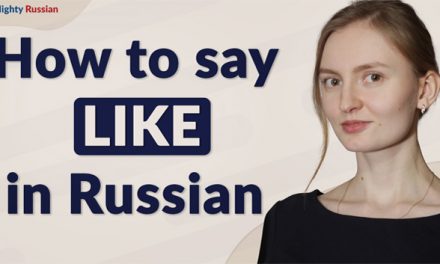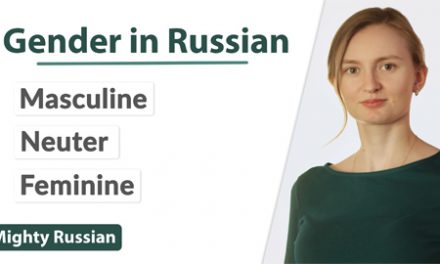The Russian Alphabet
Many people who are starting to learn Russian are very scared of the Russian alphabet, and this fear is understandable since the Cyrillic script looks very different from the Latin one, which most learners are used to.
Although the Russian alphabet is new to most people, it’s pretty straightforward. In most situations, the words are written the way they are pronounced, which makes the learning process a lot easier.
It’s quite possible to learn the Russian alphabet in one day. It just takes a bit of practice until you feel a hundred per cent comfortable using it.
The 33 letters of the Russian Alphabet
The Russian Alphabet has 33 letters, including 10 vowels, 21 consonants, a hard sign and a soft sign.
Let’s start by taking a look at the vowels:
Russian Vowels
1) А а
The Russian “А” is similar to the English “A” in “father” or “car”.
For example:
машина (car)
лампа (lamp)
2) Э э
The Russian “Э” has a sound similar to that of “E” in “end” or “rent”.
For example:
это (this)
эра (era)
3) О о
The Russian “О” has a sound similar to that of “OU” in “bought” or “fought” (British English).
For example:
стол (table)
дом (house)
4) У у
The Russian “У” is pronounced in a similar way to “OO” in “book” or “cook“.
For example:
университет (university)
умный (smart)
5) И и
The Russian “И” has a sound similar to that of “EE” in “see” or “bee“.
For example:
интересный (interesting)
история (history)
6) Ы ы
The Russian “Ы” doesn’t have an equivalent sound in English. However, it can be compared to the vowel sound you hear in the exclamation of disgust “ugh“.
Make sure to watch our video lesson. There, you can hear the exact pronunciation of this letter.
Examples of words that have the letter “Ы“:
рыба (fish)
быть (to be)
7) Е е
The Russian “Е” has a sound similar to “YE” in “yes” or “yellow”.
For example:
привет (hi)
евро (euro)
8) Ё ё
The Russian “Ё” has a sound similar to “YO” in “York” or “your”.
For example:
ёлка (fir tree)
тётя (aunt)
9) Ю ю
The Russian “Ю” is pronounced in a similar way to the English pronoun “you” or the name of the letter “U“.
For example:
любить (to love)
июль (July)
10) Я я
The Russian “Я” has a sound similar to “YA” in “yard” or “yarn”.
For example:
январь (January)
Япония (Japan)
These are the 10 Russian vowels. Now let’s take a look at the 21 Russian consonants.
Russian Consonants
1) Б б
The consonant “Б” has the same sound as the English “B“.
For example:
бабушка (grandmother)
банан (banana)
2) В в
The consonant “В” has the same sound as the English “V“.
For example:
вcё (everything)
вещь (thing)
3) Г г
The consonant “Г” has the same sound as the English “G” in the words “garden” and “give”.
For example:
город (city)
говорить (to speak)
4) Д д
The consonant “Д” is almost the same as the English “D“. But unlike in English, it’s pronounced with the tip of the tongue pressed against the upper teeth.
For example:
дом (house)
дочь (daughter)
5) Ж ж
The consonant “Ж” is pronounced in a similar way to “S” in the words “measure” and “pleasure”.
For example:
женщина (woman)
жизнь (life)
6) З з
The consonant “З” has the same sound as the English “Z“.
For example:
зоопарк (zoo)
глаза (eyes)
7) Й й
The consonant “Й” is similar to “Y” in the words “yogurt” and “yes”.
For example:
мой (my)
красивый (beautiful)
8) К к
The Russian consonant “К” is just like the English “K“.
For example:
кошка (cat)
когда (when)
9) Л л
The consonant “Л” is almost the same as the English “L“. But unlike in English, it’s pronounced with the tip of the tongue pressed against the upper teeth.
For example:
лампа (lamp)
голова (head)
10) М м
The Russian “М” is the same as the English “M“.
For example:
мать (mother)
время (time)
11) Н н
The consonant “Н” has virtually the same sound as the English “N“. But unlike in English, it’s pronounced with the tip of the tongue pressed against the upper teeth.
For example:
нога (leg)
наш (our)
12) П п
The consonant “П” has the same sound as the English “P“, but it is never aspirated (there is no breath in the pronunciation of the Russian “П“).
For example:
пол (floor)
потом (later)
13) Р р
The consonant “Р” has a sound similar to the English “R“, but there is a vibration of the tongue in the pronunciation of the Russian “R” (you have to roll your r’s). Some accents in the UK and some Romance languages have an “R” similar to the Russian “Р“.
Россия (Russia)
друг (friend)
14) С с
The consonant “С” has the same sound as the English “S“.
For example:
сын (son)
солнце (sun)
15) Т т
The Russian “Т” is very similar to the English “T“. But unlike in English, it’s pronounced with the tip of the tongue pressed against the upper teeth. Moreover, it’s never aspirated (there is no breath in the pronunciation of the Russian “T“).
For example:
там (there)
что (what)
16) Ф ф
The consonant “Ф” has the same sound as the English “F“.
For example:
фото (photo)
фамилия (surname)
17) Х х
The consonant “Х” has the same sound as “CH” in the word “Loch Ness” or a sound similar to “H” in the words “Hello” and “happy”.
For example:
хорошо (good)
хотеть (to want)
18) Ц ц
The consonant “Ц” has the same sound as “TS” in the word “tsunami”.
For example:
церковь (church)
цирк (circus)
19) Ч ч
The consonant “Ч” is pronounced in a similar way to “CH” in “chair” or “child”.
For example:
чёрный (black)
час (hour)
20) Ш ш
The consonant “Ш” is pronounced in a similar way to “SH” in the word “short”, but it’s a bit harder (similar to the German “sch“).
For example:
шутка (joke)
шорты (shorts)
21) Щ щ
The consonant “Щ” has almost the same sound as “SH” in English. It sounds very soft.
For example:
женщина (woman)
щенок (puppy)
Russian Soft and Hard Signs
The Russian language also has a hard and a soft sign.
1) Ь ь
The soft sign is “Ь“. The name of this letter in Russian is мягкий знак. This letter doesn’t have any sound when used on its own.
The main function of the soft sign, as the name suggests, is to make the preceding consonant soft.
For example:
день (day)
In the word “день“, “Н” is soft. It’s pronounced as “GN” in “cognac”.
2) Ъ ъ
The hard sign is “Ъ“. The name of this letter in Russian is твёрдый знак. This letter doesn’t have any sound when used on its own either.
The main function of the hard sign is to separate two sounds in a word.
For example:
объект (object)
In this word, the hard sign (Ъ) separates the sounds of the letters “Б” and “Е“. If there wasn’t a hard sign in this word, “Б” and “Е” would be pronounced together.












I appreciate your attempts and I am really a lover of Russian language.